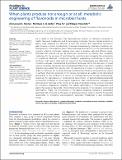When plants produce not enough or at all: metabolic engineering of flavonoids in microbial hosts
Author(s)
Trantas, Emmanouil A.; Koffas, Mattheos; Xu, Peng; Ververidis, Filippos
DownloadTrantas-2015-When plants produce.pdf (4.455Mb)
PUBLISHER_CC
Publisher with Creative Commons License
Creative Commons Attribution
Terms of use
Metadata
Show full item recordAbstract
As a result of the discovery that flavonoids are directly or indirectly connected to health, flavonoid metabolism and its fascinating molecules that are natural products in plants, have attracted the attention of both the industry and researchers involved in plant science, nutrition, bio/chemistry, chemical bioengineering, pharmacy, medicine, etc. Subsequently, in the past few years, flavonoids became a top story in the pharmaceutical industry, which is continually seeking novel ways to produce safe and efficient drugs. Microbial cell cultures can act as workhorse bio-factories by offering their metabolic machinery for the purpose of optimizing the conditions and increasing the productivity of a selective flavonoid. Furthermore, metabolic engineering methodology is used to reinforce what nature does best by correcting the inadequacies and dead-ends of a metabolic pathway. Combinatorial biosynthesis techniques led to the discovery of novel ways of producing natural and even unnatural plant flavonoids, while, in addition, metabolic engineering provided the industry with the opportunity to invest in synthetic biology in order to overcome the currently existing restricted diversification and productivity issues in synthetic chemistry protocols. In this review, is presented an update on the rationalized approaches to the production of natural or unnatural flavonoids through biotechnology, analyzing the significance of combinatorial biosynthesis of agricultural/pharmaceutical compounds produced in heterologous organisms. Also mentioned are strategies and achievements that have so far thrived in the area of synthetic biology, with an emphasis on metabolic engineering targeting the cellular optimization of microorganisms and plants that produce flavonoids, while stressing the advances in flux dynamic control and optimization. Finally, the involvement of the rapidly increasing numbers of assembled genomes that contribute to the gene- or pathway-mining in order to identify the gene(s) responsible for producing species-specific secondary metabolites is also considered herein.
Date issued
2015-01Department
Massachusetts Institute of Technology. Department of Chemical EngineeringJournal
Frontiers in Plant Science
Publisher
Frontiers Research Foundation
Citation
Trantas, Emmanouil A., Mattheos A. G. Koffas, Peng Xu, and Filippos Ververidis. “When Plants Produce Not Enough or at All: Metabolic Engineering of Flavonoids in Microbial Hosts.” Frontiers in Plant Science 6 (January 29, 2015).
Version: Final published version
ISSN
1664-462X